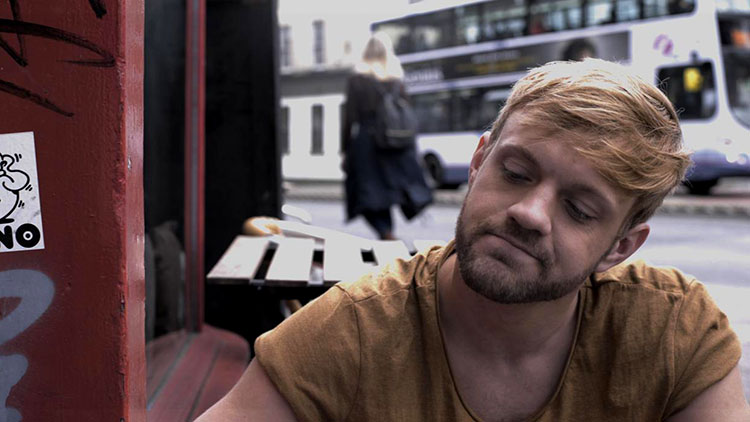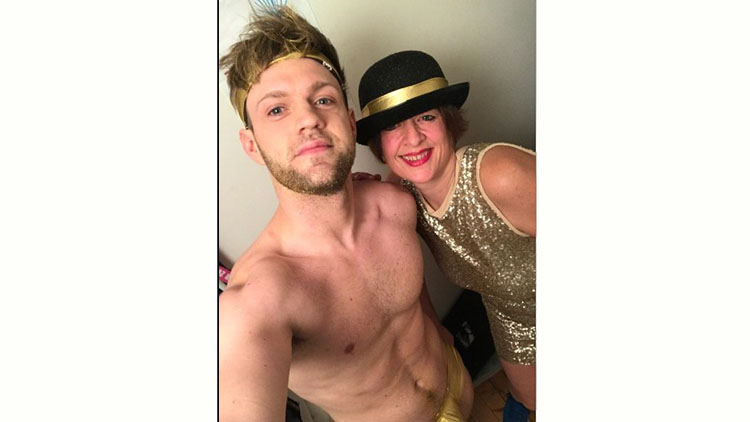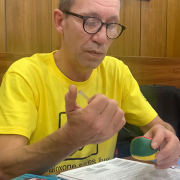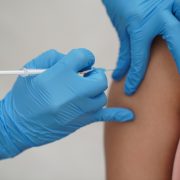
After coming out as gay, the actor and writer Denholm Spurr found himself homeless and increasingly isolated. He recalls the chance meeting that turned his life around
When I finally came out, London seemed like it would be a place of acceptance. I moved to the capital when I was 22, after I finished drama school. This choice was mainly career-driven, but I had hoped it would be where I could finally be myself.
I was born in East Croydon, but when I was young my parents moved to Surrey, so I spent the majority of my childhood there. I never felt I could come out when I was younger. In the schools I went to, being gay was not something that was encouraged. I remember there was one guy who came out and was ostracised by everyone – that is what I thought would happen if I did the same, and I did not want that.
I went off to Oxford School of Drama. Being there allowed me to see my own internalised homophobia and fear of who I really was. During that time, I let my other friendships go by the wayside. So, when I came to London I felt like I had no one from my past life on speed dial.
When I came out, my parents did not know how to handle it. The relationship with them was already fragile; their reaction made me feel rejected completely. When I would go home, they would ask me to keep my toothbrush out of reach, because they were afraid of contamination from hepatitis. I felt like a monster whenever I went there. So I stopped going. And that is how I ended up being homeless.

London is such a big city, and it became incredibly lonely for me. Because there’s just so much choice and things to do, people’s abilities to invest and focus on one single deep connection diminishes – unless you find communities that welcome you in. I came to see London as one of the worst cities for human connections.
I had some friends that I was still in touch with, but I felt that if I were to reach out to them, it would be like coming out all over again. I was afraid that they would reject me too.
I tried to keep myself off the street. My first night in London, I was in a gay bar and I met a guy. He let me go back to his house and I stayed there for two months. After that, I went from couch to gay saunas, to wherever I could find somewhere to stay.
Initially, the gay community welcomed me in such a way I never experienced before. I was a young blond attractive guy. People were interested in me and wanted to speak to me. Although this interest felt nice, not everyone had good intentions.
Most of my interactions were of a transactional nature. I would sleep with people from Grindr, initially, in exchange for a place to stay the night, later on for money. The transactional nature of my social life fed into the person who I had become: by seeing myself as a commodity, opposed to a human being, it stopped me from having more genuine, long-lasting connections.
I spent almost every Monday night at the saunas. During the time I was homeless, there were many gay saunas open 24/7 around London. Because of the long time I would spend in the sauna, I would develop friendships, short, fleeting friendships.
Over the years, I overvalued many of these connections I thought I had, because of my prior experience. When I would get close with someone, I would overestimate what that person felt for me. I would meet a guy and spend the entire weekend with him. In my head I was in a relationship with this guy; then we would never speak again. It was heartbreaking.

I reached the peak of isolation when I found out my HIV status. I was so terrified of telling anyone. I thought that if I said I was HIV positive, nobody would want to be with me. It made me feel very very lonely.
At that time, I was still doing any acting job I could find. While I was working, I was very good at hiding the fact that I was homeless. In a way, I was living this double life. I felt it was very isolating not to be able to tell people, or not knowing who I could trust telling. It was such a big part of my life that no one knew.
However, it was through one of these acting jobs that I met Rebecca. I had just been taken off the housing list, after staying at a temporary accommodation for six months. They wanted me to pay £240 a week to stay there, so I left. Rebecca offered to let me move in with her. I was originally going to stay rent free for some weeks, until I was able to find somewhere else to stay. I ended up living with her and her son in her apartment in Brixton for four years. In this time, she helped undo all the toxic mechanisms that had become part of me. It took me a long time to stop valuing myself based on my body, and start valuing myself based on just being a human, able and worthy of friendship. Living with her and her son provided me with a familial environment that was really helpful for me to reconnect with people. Her son’s schoolmates would come over, so would her university friends, and many different people that I would meet and interact with. We are still in contact to this day.
All it took to put my life back on track was one genuine, deep connection. I now live in an almost-affordable flat in East Croydon with my boyfriend. And my family came to the opening night of “No Sweat“, a show that brought to the stage my experience as a gay homeless man. Having them in the first rows felt to me like a full circle moment.
As told to Eleonora Girotto. The show “No Sweat” by Vicky Moran ran at the Pleasance Theatre, London, from February 6 to February 29.
This is day three of four in Eastlondonlines’ #IsLondonLonely? series. Read the rest of the series here.




